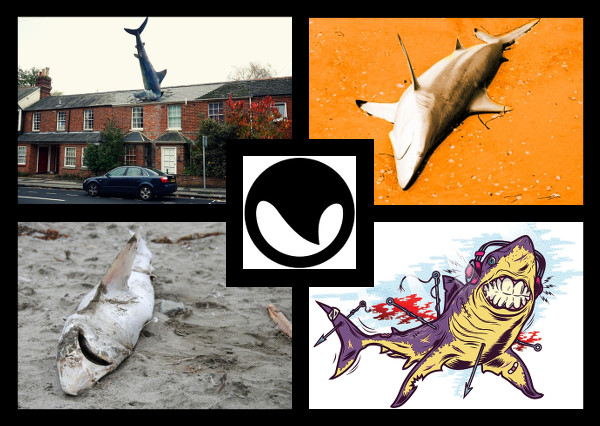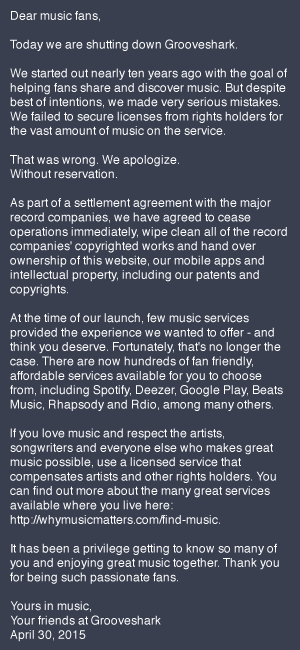I Knew Grooveshark. Grooveshark Was a Friend of Mine.
June 10, 2015 Leave a Comment

In the spirit of digital copyright infringement, the image for this blog entry is composed of illustrations from (clockwise from top left) The Atlantic, Slate, Billboard, and Gizmodo.
Also the Grooveshark logo cleverly turned upside down like a dead fish. It’s clever.
I’m not yet sure how I feel about Apple Music. Or rather, I know it bothers me, but I’m not exactly sure why yet. A rant is probably forthcoming in the next few days. But it has made me think more on the fate of Grooveshark, a streaming service that shut down on April 30.
Despite claiming 35 million users, Grooveshark never amassed much mainstream mindshare. That’s surprising, because it was a vast repository of easily linkable and shareable songs, all completely free. It looked slick, it was easy to use, and listeners could even upload songs for the whole world to enjoy.
Which was pretty much the problem.
 Intellectual property is a difficult concept to grasp, and is only becoming more so as copying and distributing files gets easier and easier. The philosophy is often fancily phrased as “information wants to be free”. Less elegantly, if it’s so easy to get stuff without paying, it must be all right.
Intellectual property is a difficult concept to grasp, and is only becoming more so as copying and distributing files gets easier and easier. The philosophy is often fancily phrased as “information wants to be free”. Less elegantly, if it’s so easy to get stuff without paying, it must be all right.
Well, it’s not. Argue ethics all you want, pretend you’re taking a stand for artists, demonize the Recording Industry Association of America ’til the cows come home – it’s not all right legally. Grooveshark knew it, and posted a (most likely court-mandated) apology on its Web site.
“We failed to secure licenses from rights holders,” the statement read in part. The lawsuit and settlement focused on thousands of songs uploaded by employees, because vagaries of copyright law give safe harbor to those that host unlicensed material – even if the whole purpose of a platform is to explicitly or implicitly encourage people to share copyrighted stuff. The suit largely ignored the millions of songs uploaded by users.
Users, yeah, like me.
Grooveshark suited my purposes of sharing my own music. A single clickable link took people to playlists I’d created, or to my artist page. No one needed to sign in or download an app. But that was my choice as a recording artist, for my own creations.
Those links are now removed. In all honesty, I hadn’t even realized Grooveshark was gone until I tried to share the links in a conversation online. Now folks will have to go to Spotify, or Google Play, or Rhapsody, or any of the dozens of other services that CD Baby distributed my work.
I won’t pretend I never used Grooveshark for less honorable purposes. Had a platform existed that already included every one of the songs I wanted to share and allowed custom playlist linking, I would’ve used it, but it didn’t.
Apple Music won’t do everything Grooveshark did, because a lot of what Grooveshark did was illegal. Grooveshark tried to be everyone’s music service by ignoring intellectual property altogether; other services got closer to an equitable solution. YouTube figured out more or less automatic licensing, so that rights holders of uploaded songs get paid at least a tiny bit. SoundCloud has managed to police itself fairly well as a platform for creators rather than pirates.
Grooveshark was great. But it was never okay.




